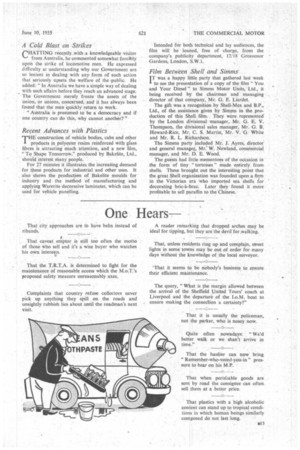One Hears—
Page 47

If you've noticed an error in this article please click here to report it so we can fix it.
That city approaches are to have belts instead of ribands.
That caveat emptor is still too often the motto of those who sell and it's a wise buyer who watches his own interests.
That the T.R.T.A. is determined to fight for the maintenance of reasonable access which the M.o.T.'s proposed safety measure unreasonably axes.
Complaints that country refuse collectors never pick up anything they spill on the roads and unsightly rubbish lies about until the roadman's next visit. A reader remarking that dropped arches may be ideal for tipping, but they are the devil for walking.
That, unless residents ring up and complain, street lights in some towns may be out of order for many days without the knowledge of the local surveyor.
That it seems to be nobody's business to ensure their efficient maintenance.
The query, "What is the margin allowed between the arrival of the Sheffield United Tours' coach at Liverpool and the departure of the I.o.M. boat to ensure making the connection a certainty?"
That it is usually the policeman, not the parker, who is nosey now.
Quite often nowadays: "We'd better walk or we shan't arrive in time."
That the haulier can now bring " Remember-who-voted-you-in " pres
sure to bear on his M.P.
That when perishable goods are sent by road the consignee can often sell them at a better price.
That plastics with a high alcoholic content can stand up to tropical conditions in which human beings similarly composed do not last long.




























































































































































